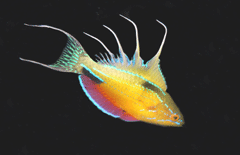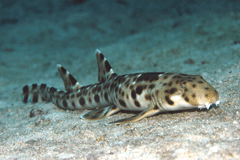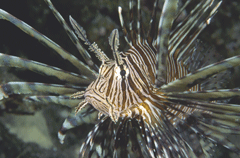The Name Game
Air Date: Week of September 21, 2007

This species of flasher wrasse was discovered in April 2006. It is known only from the southern Bird’s Head Seascape, from Raja Ampat to Triton Bay. (Photo: Gerry Allen (c))
Prince Albert II of Monaco has teamed up with Conservation International to host a benefit aimed at raising money for Indonesian conservation efforts. Up on the block are the naming rights for ten new marine species. Peter Seligmann, CEO and founder of Conservation International, tells host Steve Curwood the reasoning behind the “Blue Auction.”
Transcript
CURWOOD: When Conservation International finished an expedition last year off the coast of eastern Indonesia in an area known as Bird's Head Seascape, the scientists had discovered more than 50 new species, including a number of fish. This fertile ocean area has been hit hard by commercial fishing, as well as by the dynamiting and poisoning of coral reefs, and many of these newly discovered creatures are at risk of going extinct.
So, to raise some money to fund a protection project for the area, Prince Albert II of Monaco has joined hands with the conservation group and the Monaco-Asia Society to host a "Blue Auction." And on the block at the affair? The scientific naming rights for ten of these new species. Peter Seligmann is the founder and CEO of Conservation International.
SELIGMANN: We hope to raise at least two million dollars for the region and we may exceed that. This is an area that needs financial support. It is an area that is under siege and under threat. What's wonderful is that the government has just decided that their future, for their communities, is going to be better served if they develop sustainable use of the resources. So that we've got a moment when the communities and the government are saying, ‘we understand how important this is, we want to take some action to protect it. We are going to prioritize caring for this landscape and this seascape.’
CURWOOD: Now how did you come up with the idea for this auction?
SELIGMANN: I was diving in Raja Ampat in the Bird's Head peninsula in the very eastern part of Indonesia and was with the scientists that work for Conservation International and we were talking about this juxtaposition of this exquisite diversity and brilliance and beauty of life and yet the enormous threat to the area and we just knew that there was a very, very, real need for funding to ensure that Indonesians would have the training to be able to protect it. And the scientists said, ‘why don't we auction off the opportunity to name species after yourself?’

The completely singular evolutionary path this shark has taken gives it pectoral fins uniquely developed for "walking." This species was discovered last year. (Photo: Gerry Allen (c))
SELIGMANN: Yes, well first they were all discovered at the center of a region that’s referred to as ‘the coral triangle’ and it's really the area that we believe is the richest in terms of marine diversity of any place on the planet. One of the new species—actually there are two new species of sharks that were discovered—are called ‘walking sharks.’ And they're very small sharks—maybe three or four feet—and they just use their fins, the four fins, on the bottom of their body as feet. You have to really see it to believe it.

Lionfish are one of the most dangerous reef fishes, with poisonous spines that cause excruciating pain for up to three days after a wound is inflicted. First collected from Cendrawasih Bay, this new species has now been photographed from Northern Sulawesi to eastern Papua New Guinea. (Photo: Gerry Allen (c))
And there are flashing wrasses, which are these just beautifully colorful fish that when they want to—when the males want to attract the females for courtship—they have bioluminescence. They just start flashing down in the deep. I always think of it as a combination of Dr. Suess and Candy Land.
CURWOOD: [laughs] And they're not so different from humans. I guess that flashing fish is like the guy in the flashy red convertible at the beach, huh?

This species of flasher wrasse was discovered in April 2006. It is known only from the southern Bird’s Head Seascape, from Raja Ampat to Triton Bay. (Photo: Gerry Allen (c))
CURWOOD: Now what happens after somebody wins a bid to name one of these species? How will the fish actually be named?
SELIGMANN: Well, the chosen name—the name of the bidder or the name of the bidder's child or whatever, will be latinized and then will be submitted to the International Commission for Zoological Nomenclature through a publication which is called Aqua, which is a journal of ichthyology or fish. And peers will review it and they will approve it.
CURWOOD: So, let's say I had a cell phone company and the lionfish was the logo. I mean, could I have that name in my company? Could it be the Living on Earth cellular?
SELIGMANN: Well the names are going to be reviewed by a panel so we'll make some decisions if we find that there is a situation that would be inappropriate. We have a panel that can vet that. But theoretically, a company could pass this group and could be approved by this group and you could end up with a company being immortalized through a naming opportunity.
CURWOOD: Peter Seligmann is the founder and CEO of Conservation International. Good to talk with you.
SELIGMANN: Thank you so much, talk to you soon.
CURWOOD: To see pictures of the walking shark and other creatures in the auction, as well the results of the bidding, please go to our website, l-o-e dot org.
|
UPDATE - The Blue Auction, held on September 20th, surpassed its goal of raising two million dollars by a hair! The grand total for the naming rights of ten newly discovered marine species, as well as two other prizes, raked in $2,015,000.00. The big winner was the "walking shark," whose naming rights alone brought in $500,000. The winners will submit their names of choice to the International Commission for Zoological Nomenclature where they will be reviewed by a panel. The funds that were raised at the Blue Auction will be used directly to benefit three marine conservation programs in Indonesia: The Marine Empowerment Initiative, The Marine Enforcement Initiative and The Marine Conservation Education Initiative.
Links
|





